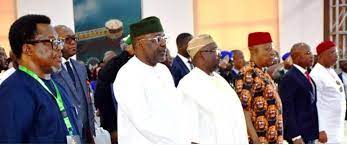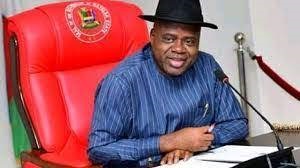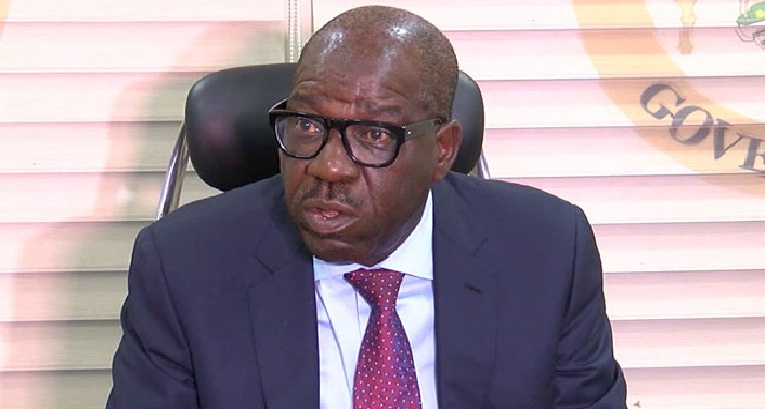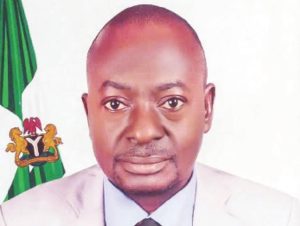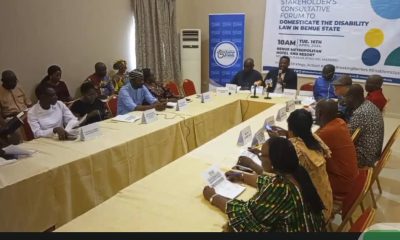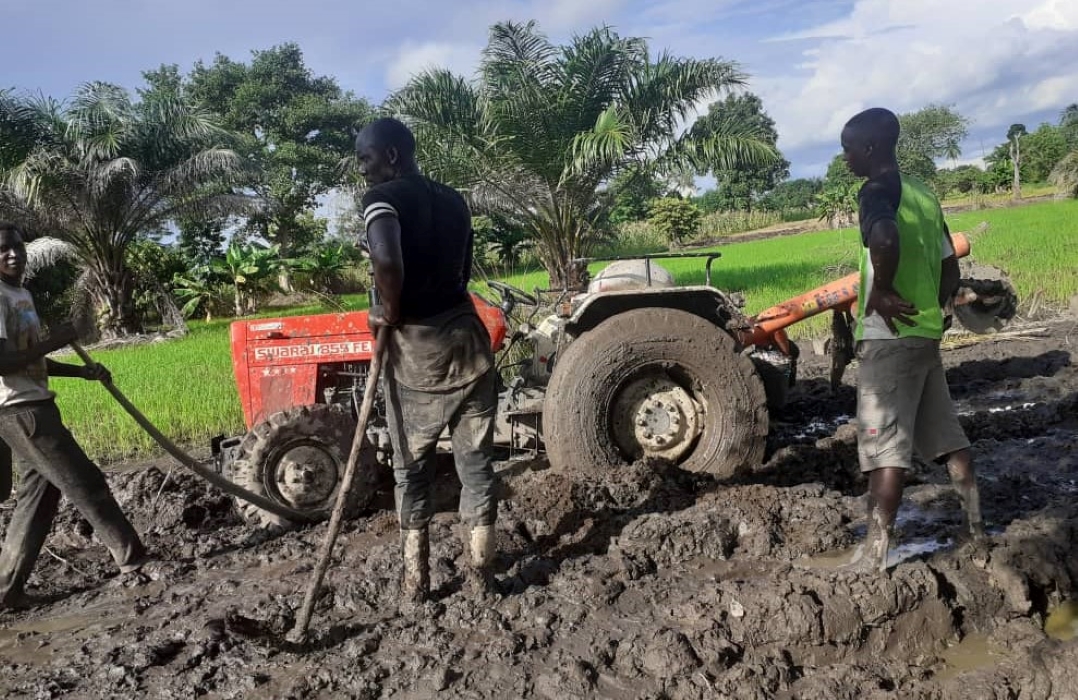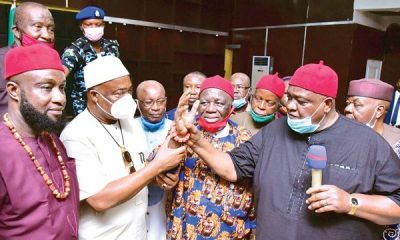OPINION
Buhari’s Outreach to South-east
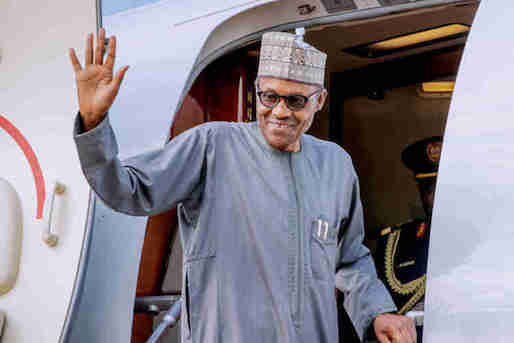
By Dakuku Peterside
Symbolic gestures are particularly evident in Africa. Ndigbo or south easterners, more than any other group attach importance to symbolic gestures. It is ingrained in their culture. However, for once, Igbos are divided over the significance and symbolisms of President Muhammadu Buhari’s visit last week to the Eastern heartland.
The visit of Mr President to Imo State has elicited many reactions.
Interestingly, most of the focus has been on the President’s attire. In a picture on social media, the President wore ill-fitting oversized trousers and traditional Igbo ‘ishi agu’ clothes which were ‘uncomplemented’ with non- matching shoes.
There have been arguments and counterarguments over whether the picture was accurate or photo-shopped. But this is an unnecessary diversion. How did we get to the stage where after the President visited Imo State, a theatre of conflict owing to secessionist agitation and where he has few friends and supporters, we are focused more on his clothes than the essence, impact, and import of the visit?Ordinarily, our discussion should focus on how the President’s alleged inability to harness the country’s diversity impacted his trip to the Southeast, how the secessionist agitation that is most pronounced in the Southeast reflected on the President’s visit and whether the visit moved a needle in his fractious relationship with most of the people in the south- eastern part of the country.
The plurality of the connotation of Southeast in the nascent geopolitics and the convoluted emotional experience of the political actors and ordinary citizens of the area make the visit of the President very significant. Southeast did not mainly vote for the President in the last two elections. Imo State is the epicentre of separatist agitation, theatre of multiple political wars, and ‘unknown gunmen’ hotspot. The President’s visit juxtaposes with the alleged perception that he hates the region, still treats it in the Biafra civil war’s mindset and mode and still considers it a lesser part of the Nigeria foundational ethnic entities. Therefore, one may ask: has the President confronted this perception of hatred of the region by this visit? Is it a signpost of a new relationship with the mainstream political centre? Does this signify the President’s readiness to engage? Is this an outreach to the Southeast?
No one was in doubt that the President’s handlers and intelligence coterie considered the area ‘an enemy territory’. The conspicuous presence of a bulletproof ballistic case carried by some of the security personnel laid credence to this. Maximum protection is always offered to our country’s leaders anywhere they go. However, the sight of this discreet close protection, rapid deployment solution that unfolds with one hand to provide a sizeable line of defence for ballistic and fragmentation threats demonstrated that the President’s handlers saw an inherent security risk to his person. In this context, the President’s visit to Imo State was an opportunity for fence-mending and peace building. The cries of marginalization have been persistent in the Southeast since the end of the Civil War. However, the perceived hostility of President Buhari towards the region and the administration’s alleged poor handling of the country’s diversity added to rising poverty have led to the clamour of separation from Nigeria becoming more popular in the Southeast.
We should commend the President for embarking on the trip in the first place. The President silenced his doubters for someone often accused of never visiting many states in the country’s south, except during election campaigns. The opposition tries to portray him as insensitive to some people’s feelings from particular areas in the country. The President has demonstrated that he is indeed the leader of all Nigerians. This new philosophy of engagement is a core democratic ideal and must be embraced by all. Through such engagement, the government and the governed exchange ideas, understand themselves and work ‘hand in gloves’ to achieve unity and prosperity.
In the light of the above, Ndigbo were happy to hear the President’s commitment and promise to complete the second Niger bridge during his dispensation. This bridge started during the Babangida regime has outlived five previous administrations. I must point out that the Niger bridge is probably the busiest transport artery in Nigeria, linking the Southeast to the other southern parts of Nigeria. Although it is erroneously considered an Igbo project, its significance and importance are national.
Furthermore, the President acknowledged the place of Ndigbo in the economic life of Nigeria. He posits that the Igbos hold economic power in Nigeria, especially in trade and real estate and are interwoven in the fabrics of economic life in every part of the country, and as such, it should be unthinkable for the Igbos to want to separate from Nigeria. Although it seems cogent in its face value, underneath it belies the contention by the Igbos that they are not at the commanding height of the national economy and have been systematically denied that opportunity since the civil war and the indigenisation decree of 1970. They are quick to point out the fact that they are not in charge of the oil and gas sector, agricultural, manufacturing, telecommunication sectors , customs and even banking. These are the major pillars of the economic life of the country.
A fact which cannot be challenged is that the economic growth of the Igbos is self-induced, and it is doubtful that the public sector has proactively created an enabling environment to harness the entrepreneurial dexterity inherent in the Igbos. The Igbo economic cocktail is brewed by their restlessness and spirit of enterprise, which has led to their phenomenal economic recovery post-civil war. I believe it is time for a synergy between the Nigerian state and the Igbo economic renaissance that should fuel the development of Nigeria. All psychological and physical curtains and ceilings placed on stopping the harnessing of the economic potential of people of this region must be lifted.
However, beyond the visit, the President must take further steps to show that he appreciates the significance and cares a lot about Nigeria’s ethnic diversity. Government appointments and policies should be promoting inclusiveness and managing our diversity. He should bring to justice people threatening the peace and security of the country irrespective of ethnic and religious leanings. Added to these, as the President-General of the Pan-Igbo cultural organization told President Buhari during the visit, despite all the threats of secessionism or separatism facing the country, there is no doubt that no secessionist element can succeed in Nigeria, provided there is good governance based on equity, justice, and fairness to all the citizens.
On their part, the leaders of the South-East should rise to the occasion and save their region from total anarchy. A local leadership deficit is part of the reason why non-state actors have taken control of the conversation. When the roads are bad, water and electricity are scarce, high unemployment rates, salaries and pensions are not being paid or never paid on time, people are more willing to heed the next charlatan or mob leader who promises them Utopia. The deafening silence of many prominent intellectuals and opinion leaders from the Southeast on the imbroglio in the region is very worrisome. Now is the time to forcefully speak out in a fruitful conversation to ameliorate an awful situation.
Governors of the South-East should establish a line of dialogue with the leadership of the proscribed IPOB. Despite their crude methods and foibles, they enjoy sympathy in the region. It may be more challenging to find a solution to the crises without their involvement. Continuous engagement is critical. Military might and solution will never be enough in tackling the problem. For the citizenry in the Southeast, the Southeast has a lot to gain from the country, remaining a united entity.
To paraphrase Prof Obiozor in his address to the President, “Ndigbo are the most federating unit among all Nigerian citizens. Anywhere in Nigeria you don’t find the Igbos, run away something is wrong there. Igbos are market people and travel adventurers.” The Igbos are the only ethnic group in Nigeria that has investments outside their land than they have in their area. Why would this group be keen on becoming foreigners in other parts of the country with attendant consequences? Why will they allow insecurity to pervade their land?
In the security circles, any society that decides to eliminate its policemen should ensure that they have made peace with their criminals. Despite the shortcomings of our security agents and prevalent unprofessionalism in their conduct, obliterating them is a straightforward recipe for anarchy. Overt and covert support for attacks on security personnel would only be counterproductive. The populace must be cautious with those who make incendiary speeches that widen the ethnic divide in the country. We as a people, irrespective of our ethnic and religious leanings, can only thrive in an atmosphere of peace and unity.
The President’s visit is highly commendable, but there are a few negatives. The first negative is that the visit should not have been branded a commissioning visit, given that the level and quality of projects to be commissioned do not warrant such a visit by the President. The visit would have been better portrayed as an engagement visit, an outreach of Mr president to Ndigbo, to start a conversation to soothe the frayed nerves of some Igbos. Significantly, the President may be visiting other states in Igbo land. There is still an opportunity for his handlers to frame his visits right. We hope that these visits may be a part of the president’s National Healing Project – an engagement with parts of the country that feel left out and on the fringes of his government. Besides, we hope these visits are extended to other parts of the nation, especially in the Southern regions, to douse the ‘Fulanisation conspiracy theory’. I will advise that he includes people of various ideological shades during these visits/engagements, especially those not known to be in cahoots of Mr president.
The second negative is that the security agents ignored or under rated the IPOB sit-at-home directive, and this led to the streets of Owerri being literarily empty, almost looking embarrassing for the President. There were not many citizens coming to cheer their President. The President’s handlers should rectify this in his further visits to other states in the Southeast.
The President has a few missed opportunities in this visit. The feeling of marginalization by the Igbos is historic and culminated in an internecine war with epic human and material losses to Nigeria. Post- civil war has seen new generation Igbos carrying the burden of the psyche of a defeated people. This psyche has seen them interpret actions and inactions and even utterances of leaders from other parts of the nation as marginalization hence their agitations.
I hope he will address proactively the angry Igbo youths who have convinced themselves that Nigeria holds no place for them, and they are better off in a utopian Biafran country that will solve all their problems. There has not been a proper high-level engagement from the top echelons of power to counter the Biafran utopia narrative. The President can use his visits to the Southeast to win the hearts and minds of the region’s youths.
OPINION
Ending the Menace of Oil Theft in Niger Delta

By Braeyi Ekiye
Standing up for justice and vocally too, is about standing up for each other. It is our duty to speak for the nation’s lingering ills to be corrected, particularly when others cannot speak up. That is the critical power of the voice for the reconstruction of the Nigerian State to attain the desired real nationhood.
Former governor and now a senator representing Bayelsa West, Seriake Dickson recently stood up to be counted on a serious national issue; oil theft and its debilitating consequences on Nigeria’s economy and security.
Answering questions on a programme at Channels Television recently, Dickson pointedly accused some very important personalities from Lagos and the Federal Capital Territory, Abuja for being behind oil theft in the Niger Delta.
Hear the Senator:” The Official system and oil companies are beneficiaries of oil theft in the Niger Delta”. Dickson bemoaned the absence of national values which he said, makes people to use the nation’s resources for selfish gains.
“People from Abuja and Lagos are the masterminds and the official system is not ignorant and not innocent. The official security system, the official oil system, the official federal system, all of it in its entirety. It’s a powerful system,” he stated.
Dickson wondered why a country like Nigeria that has been producing oil, exporting oil for the past 70 years was unable to have scientific way of metering, recording what leaves, what is pumped, what is sold and what is not sold? He concluded that it was a deliberate attempt at bleeding the country of her financial and economic wealth through illegal bunkering, superintended by local, national and international oil theft collaborators.
It is instructive that the Nigeria Extractive Industries Transparency Initiative (NEITI), had in November 6, 2023, through its Executive Secretary, Ogbonnaya Orji, said that oil theft was an emergency that posed serious threat to oil exploration and exploitation with huge negative consequences on economic growth, business projects and profit earnings by oil companies.
Orji stated that as a result of NEITI being a member of the “Special Investigative Panel on Oil Theft and Losses”, the organisation was aware that: “Oil theft is perpetrated mainly through pipeline clamping, illegal connections and major pipeline exploitation of abandoned oil well heads, pipeline breakages and vandalism of key national assets to illegally siphon crude into waiting vessels stationed in strategic terminals”.
NEITI maintained that it was a matter of fact that many members of the pipeline’s association were directly and indirectly involved in providing the skills and knowledge required to carry out oil theft.
Orji therefore, condemned the association for failing to put in place stringent regulations and appropriate sanctions to check involvement of their members.
While being hopeful that President Bola Tinubu’s leadership would spring a surprise to douse the fears, the apprehensions of critical Nigerian minds, like Senator Dickson, Ogbonnaya and many others, there is the compelling need for this administration to seriously interrogate this malignant ulcer on the nation’s oil industry. There is also the need to critically examine NEITI’s unsolicited solutions to the problems of oil theft that have held Nigeria’s economy prostrate and her developmental framework for accelerated growth in all facets stunted.
NEITI in a report titled: “Nigeria’s Battle With Crude Oil Theft: A Total of 4,145 Cases Since May 2023,” published by Arise News on November 23, 2023, revealed a staggering number of highlights of the severity of the issue at hand.
Also, in its weekly: “Energy & You” series aired on the NTA News Network, the NNPCL noted in Episode 7 that 344 crude oil theft incidents were recorded between January and April 2023. Meanwhile, by Episode 8 of the weekly NTA television series, NNPCL shared reports of crude oil theft incidents. A summation of crude oil theft incidents recorded between episode 8 (May 2023) and episode 30 (October 2023), revealed that a total of 4,145 crude oil theft incidents were recorded between May 2023 and the second week of October 2023.
According to NNPCL records, some of the more active hotspots for crude oil theft in the Niger Delta include; Ohaji-Egbema, Oguta (Imo), Ogbia, Imiringi (Bayelsa), Obodo-Omadino, Ughelli (Delta), and Egorobiri creek, Gokana, Iba community, Emuoha, Rumuji, Degema (Rivers).
Nuhu Ribadu, the National Security Adviser, had revealed in August 2023, that: “the country was losing 400,000 barrels of oil per day to crude oil thieves”. This led to commentators insisting that the persistence of crude oil theft in Nigeria lays bare the deep-rooted issues of corruption and severity of vulnerabilities in the country.
That, Nigeria lost more than ₦4.3 trillion naira to oil theft in five years, stolen in 7,143 pipeline vandalism cases is not news. NEITI had revealed this startling loss at the Nigeria Interventional Security Conference in Abuja, with the theme: “Bolstering Regulations, Technology and Security for Growth”, way back in November 2023. The conference was organised by the Pipeline Professionals Association of Nigeria. In a presentation at the conference, NEITI, the federal government agency, revealed that oil theft and losses in Nigeria have become a national emergency, and shall I say, a monumental embarrassment to the country.
Recently, Senator Munir Nwoko, representing Aniocha/Oshimili Senatorial Constituency shed more light on this disturbing matter. Nwoko said that certain security officials whose primary duty is to safeguard oil and gas assets, are actually complicit in this illegal trade. “They are driven by the financial gains associated with illegal activities”, the distinguished senator said.
The crude oil theft network encompasses a broad spectrum of individuals and groups as Senator Dickson rightly pointed out at the Channels TV interview and corroborated by NEITI. It involves foreign oil traders, shippers, bankers, refiners, top-ranking politicians and even military officials.
Providing data from the agency’s reports to back his claims, NEITI’s Orji, said: “NEITI in the last five years, 2017-2021, has found that Nigeria recorded 7,143 cases of pipeline breakages and deliberate pipeline vandalism resulting in crude theft and product losses of 208.639 million barrels valued at $12.74m or N4.325 trillion. NEITI reports also disclosed that during the same period, Nigeria spent ₦471.493 billion to either through repairs or maintenance of pipelines.
The criminal exploits, NEITI said, takes place, ‘most times in atmosphere of communities’ complicity and conspiracy of silence. This, therefore, calls for the Tinubu administration to swiftly swing into action to put an end to this dastardly act, or at least, reduce it to the barest minimum. After all, the state security agencies for effecting a quick resolution of this matter are at the president’s beck and call.
It would also be recalled that NEITI released empirical data of oil theft and losses way back 2009 and 2020 to the staggering figure of 619.7 million barrels of crude, valued at $46.16 billion or ₦16.25 trillion. In addition, Nigeria lost 4.2 billion litres of petroleum products from refineries, valued at $1.84 billion at the rate of 140, 000 barrels per day, from 2009 to 2018. Thus, the total value of crude losses between 2009 and 2020 is higher than the size of the country’s reserves and almost 10 times Nigeria’s oil savings in Excess Crude Account, NEITI said.
So, how long shall Nigeria continue to condone these criminal activities? The country’s inability to proffer answers to these questions will continue to keep Nigeria in a state of coma in her overall developmental strides, including her peace, unity and security.
Ekiye writes from Yenagoa, Bayelsa State.
OPINION
NIN-SIM Linkage and the Nigeria We Desire
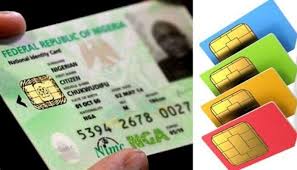
By Tunde Akanni
Rights and responsibilities are the twin words that best describe the inception and the increasing impact of digital technology, a major strand of which is the dynamic contemporary telecommunication services. Even before the imminent(?) internet of things (IOT), a lot is playing out for human civilisational process throwing up existential challenges for citizens and duly requiring governmental interventions to cope with.
If only to safeguard innocent citizens from the antics of criminals, government is often quick at fashioning laws and penalties for violations.
The most far reaching legal intervention in this context is the Cybercrimes Prohibitions Act of 2015 with its most significant component being the Cybercrime Advisory Council. Incidentally, this Council is considered rather exclusionary by media and allied rights advocates.The said deficit of the Cybercrime Advisory Council is a pointer to the fact that in climes such as ours, not much attention is often given by government to social needs, specifically in this case, Media and Information Literacy, MIL, already over hyped by the informed stakeholders. Unfortunately, some undiscerning members of the society keep falling falling victim of related laws.
Please follow this pathetic story, the audio of which I keep till date: Muhammad is a private school principal at Nyanya, an Abuja, suburb. As a side hustle, he runs a Point of Service (POS) business for payment. Then came a criminal one day who had just robbed and killed his victim. Using his victim’s card, he requested two transfers of N500,000 each.
The criminal made several other purchases and also went to some other operators of POS. Eventually he was found out and law enforcers had to track all transactions he had carried out with the victim’s card. Muhammad of Nyanya thus became a suspect and was promptly arrested. Thus began endless investigations… Muhammed ended up being detained for months in a prison.
You can imagine the psychological torture not only for Muhammad but his immediate family, employers and others who love him. He learnt his lesson in the bitterest way yet his ordeals could have been averted by sufficient exposure to basics of MIL. But life goes on. Indeed, it must be business as usual
Otherwise how do we explain the cacophony playing out after the expiration of the deadline of 29 March for NIN-SIM linkage? The Nigerian Communications Commission (NCC) has confirmed that it would not be reviewing its deadline to bar owners of more than four SIM cards whose SIM registration data failed to match their National Identity Number (NIN) data.
The Commission explained that its position was hinged on its objective to clean the country’s SIM ownership database, and ensure that criminals could not take advantage of having multiple unlinked SIMs to carry out their nefarious activities. The Commission’s resolve is hinged on the need to close in on the chaos of untoward ownership of multiple SIM cards with unverified NIN details. According to the Commission “we have instances where a single individual has over 10,000 lines linked to his NIN. In some cases, we have seen a single person with 1,000 lines, some 3,000 plus lines. What are they doing with these lines?
The NCC has also provided Mobile Network Operators (MNOs) an extension till 31 July within which they are expected to verify all NINs submitted by subscribers with four or less SIMs, as well as bar those whose NIN fail verification with NIMC.
The Chairman of Association of Licensed Telecommunication Operators, Gbenga Adebayo, further confirmed that members of his association would comply.
However, just the next day or so after the deadline expired, yours sincerely sighted no fewer than three reports announcing the extension of the deadline, one of them stating specifically to 31 July, referring to some reliable inside source.
What’s all the fuss about really? This NIN-SIM linkage is a simple exercise that only requires a subscriber to submit his or her NIN to the service provider to enable the service provider match details of the subscriber taken at the time of initial SIM registration process. This could be done through assorted windows including physically by visiting designated points. For techno-literate persons, they are merely expected to use short, universal codes for both submission and retrieval for those who may want to verify their own compliance as the media kept repeating deadlines.
The reality today is that barely literate persons and even illiterates now use telephones given its increasing centrality to a lot of human activities. This is the basis of this writer’s advocacy for an earlier generalist nomenclatural label suggestion of “Digital Culture” in place of “Digital Economy” preferred by Minister Ali Pantami when he chose to rename the ministry he was asked to superintend over (https://www.thecable.ng/digital-culture-or-digital-economy)
Telecommunication industry players have been unequivocal about the key benefit of NIN-SIM linkage being the protection of subscribers and prevention of crimes such as exemplified above. For instance, on account of the huge amount involved, the POS operators may have documented details of whatever identity provided by the criminal. As a matter of fact, the truth may have been readily revealed in the course of such documentation. But the information literacy knowledge could only have been deployed based on certain pre-existing conditions such as NIN-SIM linkage offers an example.
Still on crime, another major advantage that may derive from the NIN-SIM linkage is the ease with which law enforcers may trace and tackle criminals through their registered lines. Afterall, no one may be allowed to own any line except you are ready to play by the set rules.
Furthermore, this linkage thing will automatically ease economic transactions electronically since identities will be easily verifiable for concerned parties such as it pans out with regards to debit cards and similar devices. NIN-SIM linkage is therefore the way to go and the exercise has to run with a good measure of discipline especially with existing spectacular anomalies of thousands SIMs connected to some individual.
At this stage, the campaigns executed so far need be audited to make for genuine inclusivity with regards to social, geographical and other possible lines. For instance, this task now requires a well designed stakeholder mapping. The mapping must ultimately reveal spots of irregularities and areas as well as interests deserving more attention.
Given that all media genres had been previously deployed perhaps for conventional announcements, how about aligning subsequent dissemination more enriched via regular media contents? How about being more scientific, relativizing media use depending on audience preference and possible perception? In reality this could translate to devolving dissemination more to the grassroots by enlisting the emerging broadcasters namely, community broadcasters and campus broadcasters.
Beyond liberalising the media to be used, campaigns must also be made to align with credible programmes with obvious trendy touch of management such as may ensure their global reach and enduring availability as may be made possible by platforms like Youtube and Spotify.
With affiliation to champions of multi-stakeholder philosophy like the UN’s annual Internet Governance Forum, IGF, for the management of telecommunication facilities, need NCC be reminded of the importance of democratised governance culture?
It is most certain that the involvement of the relatively cheaper (not necessarily technologically inferior) community and campus broadcasters will help to boost the NIN-SIM linkage campaigns and indeed others that may arise in future.
It will as not be out of place for NCC to support the campaigns for the popularization of Media and Information Literacy. This certainly will help to resolve a lot of digital divide inspired issues
With the concern demonstrated on this exercise so far, NCC has demonstrated that it now has an improved corporate governance culture as advocated by IGF (https://punchng.com/nigerias-communication-governance-indifference/ ). It can however do better and even excel.
Akanni is an associate professor of media and development at the Lagos State University. Follow him on X via @AkintundeAkanni
OPINION
The Lessons of Okuama Tragedy
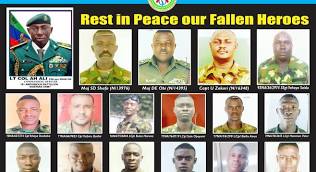
By Michael Owhoko
Has Nigeria learnt any lessons from the Okuama massacre? Will the incident repeat itself or offer profound lessons against a future experience? In the journey of life, no individual or nation or country is immune from occurrences thrown up by circumstance, which may be pleasant or painful.
Lessons from such experiences are deployed to prevent possible future reoccurrence, failing which the same catastrophe would repeat itself.In context, the gruesome murder of army officers at Okuama in Ughelli South Local Government Area of Delta State, which transcends ethnic emotions and was accompanied by wide condemnations, is a confirmation that Nigeria has not, and does not learn from lessons, otherwise the calamity would have been avoided.
The incident was not the first of its type. It had happened previously at Odi, Bayelsa State; Zaki Biam, Benue State; and Gbaramatu, Delta State, yet it appeared that neither the Federal Government nor the Nigerian Army learnt any lessons from the earlier occurrences. This is evident from the Okuama saga, a proof of the country’s insensitivity to bloodshed and exposition of poverty in the policy making process.
This notwithstanding, the Okuama calamity has again thrown up another opportunity for lessons to be learnt. If Nigeria fails again, this time around, to learn from these happenings, then the country risks further carnage, which may possibly take a more complex form, with unmanageable and unpredictable consequences. It may be too costly for the country’s fledgling socio-economic balance and stability.
Therefore, the lessons are crucial and should be identified by government, to be harnessed as feedback for proactive purposes, to forestall future recurrence. It is a tragedy for any country with a relapsing experience, not to have a codified strategy encapsulated in a template to resolve related matters. In specific terms, what then are the lessons and takeaways from the Okuama disaster?
Lesson One: To have allowed a land dispute over fishing rights between Okuama and neighbouring Okoloba communities in Bomadi Local Government Area, Delta State, to escalate means there were no proactive measures and prompt concerted interventions by the Nigeria Police Force and Delta State Government, in response to petitions written by the Okuama community.
The community, through its lawyers, I. Ejedegba and Co., had written a petition to the Commissioner of Police in Asaba, Delta State, which was acknowledged on 31 January, while that written by the community’s leaders to the Delta State Governor was received on 2 February. This was over one month before the gruesome murder of the military officers on 14 March.
Since the Police is the first line of contact and statutorily responsible for civil security matters, they should have waded in upon receipt of the petition, to nip the crisis in the bud, aside the previous joint meetings held among the communities, the Police and the Delta State Government that yielded no solution. Under this development, the Delta State Governor should have been advised to wield the big stick by acquiring the land in contention for public interest, to end the crisis.
Lesson Two: Inviting the Army for a mediatory and peace mission to Okuama for the resolution of a land dispute between two communities that were not at war, was an error in judgement. The dispute was civil in nature, and it was only when the efforts by the Police and the Delta State Governor had failed, and there was evidence of likely escalation into a dangerous dimension beyond the capacity of the Police, that would have warranted the intervention of the Nigerian Army. It is not the responsibility of the Army to broker peace in a civil matter.
Lesson Three: Central to the killing of the military personnel in Okuama is presumably oil. Oil appeared to be the underpinning motive behind the horrendous and senseless killings. Mere land dispute between two communities could not have led to such a mindless massacre. Soldiers are deployed to the Niger Delta region to protect oil facilities, and in the course of this duty, they might have been marked as “enemy” by those profiteering from illegal oil deals.
Those involved in crude oil theft and other illegal activities, including the processing of locally refined products, might see the Army as an obstacle to their business interests. The military high command should have known this, and prepared the soldiers for any possible eventuality and collision with entrenched oil thieves.
The circumstances of their deaths showed that the military men were taken unawares. It was likely that crude oil thieves and other vested interests might have planned and taken advantage of the soldiers’ peaceful disposition to unleash mayhem on them in such a horrific and despicable manner.
Lesson Four: The mass destruction of Okuama by the Army in response to the death of the soldiers, without singling out the culprits, was unhelpful, as innocent children, mothers, the elderly, the sick and even pregnant women, were either killed, rendered homeless or died while trying to escape.
To bring pain on an entire community over the action of a few criminals, is indefensible. Reprisal attacks and collective punishments are incompatible with international law.
It should be recalled that after the destruction of Odi by the Army, the community resorted to litigation and got a favourable judgement, leading to the payment of a N15 billion out-of-court settlement as compensation. Justice Lambi Akanbi of the Federal High Court had condemned the government for a “brazen violation of the fundamental human rights of the victims to movement, life and to own property and live peacefully in their ancestral home.”
Since the Okuama experience is reminiscent of the destruction in Odi, it is likely Okuama may seek redress in the law court for compensation over the reprisal destruction of lives and properties.
Lesson Five: As the President and Commander-in-Chief of the Armed Forces of Nigeria, Bola Tinubu’s order to the Army was too hasty and reactionary, without taking into consideration innocent lives in Okuama that were caught up in the web. Granting “full authority” to the military to bring anybody found to have been responsible for the attack to justice was an obvious blanket licence for the military to invade Okuama.
Instead, the President should have ordered the security agencies and the Police to specifically intervene, identify and arrest the criminal elements in the community, while instituting an independent high-powered panel of enquiry to unravel the causes of the mayhem. A future restraint on the part of the President is imperative to douse tension and minimise further collateral damage.
Lesson Six: The Army’s decision to lock down and lay siege to Okuama without granting access to the Delta State Governor, the Police, humanitarian agencies, and even the press to assess the situation on ground, has given rise to speculations about the plight of the members of the community, particularly the innocent, helpless and indigent persons. This is unhelpful to the image of the Army.
By not allowing access, the Army has unwittingly opened its operations to speculations. For example, it was alleged that the Army killed over 5O persons in Okuama, with other survivors hiding in the bush, including old women, children, the elderly ones and even the sick, with no food to eat or water to drink. This is a gross violation of their fundamental human rights.
To avoid being put on the spotlight, it is imperative for the military to grant access into the community to enable humanitarian agencies and volunteer groups extend help and assistance to the innocent ones, to prevent further fatalities. This will also serve the interest of the Army’s reputation.
Lesson Seven: After the destruction of Odi, initial public sympathy for the military waned. The same is replicating itself in Okuama over the conduct of the Army. The Army, like other Federal Government agencies, is not a supreme institution that is above the Constitution and the Nigerian State, neither is civilian population subject to military laws.
Indeed, the Army is subject to civil authority under a democracy. Therefore, it must change its current tactics at Okuama, where it has refused access to the community, assumed being the sole information provider on goings-on, and subjected civilians to investigation, arrest and detention.
It is hoped that these lessons will serve as reference and guide for the state governments, the Police, the Army and the federal government in the handling of related crises to avert future disasters.
Owhoko, a Lagos-based public policy analyst, author, and journalist, can be reached at www.mikeowhoko.com, and followed on X (formerly Twitter) @michaelowhoko.

